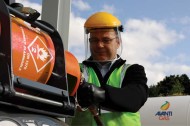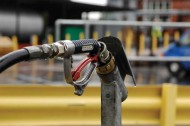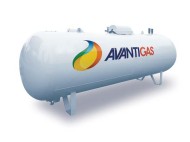 AvantiGas is the brand new identity for the Derbyshire-based business previously known as Shell Gas (LPG), which has been consistently delivering safe, reliable LPG products and services to industry since the 1960s for use as a power source for fork lift trucks, a storage heating fuel for warehouses and much more.
AvantiGas is the brand new identity for the Derbyshire-based business previously known as Shell Gas (LPG), which has been consistently delivering safe, reliable LPG products and services to industry since the 1960s for use as a power source for fork lift trucks, a storage heating fuel for warehouses and much more.
The name change follows UGI Corporation buying the business on October 2011 as part of a series of acquisitions, making American-owned UGI one of the largest LPG providers in the world. Under the new ownership AvantiGas will continue to supply LPG in bulk to industrial users and champion the benefits of LPG. AvantiGas will continue to be managed as a local company, focusing solely on LPG and providing high levels of customer service and safety to all its customers.
Darren Rogers, AvantiGas’s Key Account Manager, spoke to Warehouse & Logistics News.
Warehouse & Logistics News – First of all, Darren, what does your role at AvantiGas involve day to day? How are you structured as a business to sell these products to this sector?
My role at AvantiGas is to generate new business through key prospects within specific target segments. On a day to day basis we are identifying potential new business and working with OEM’s and industry specific business partners to formulate bespoke solutions to our potential customers’ LPG requirements. AvantiGas is a Direct Sales environment.
WLN – How is LPG produced?
Liquefied Petroleum Gas, or LPG, comprises propane, butane and mixes of the two, and is produced from the oil refining and natural gas extraction processes.
WLN – Where do you source the LPG that you sell in the UK?
AvantiGas have two strategic supply points with Mossmorran and Stanlow terminals with a good supply of product. We also then operate through 15 depots throughout the UK to give full, efficient national coverage.
WLN – We last spoke to your business just before IMHX 2010. How has the UK marketplace for LPG for fork lifts changed since then?
The LPG markets for fork lift trucks have really followed all industry trends, whereby the end user is conscious of delivering cost savings to their business. The return on investment that AvantiGas has been offering with a bulk supply has sat within many companies’ strategy on cost savings. We have been able to demonstrate savings against cylinder supplies with a specially designed calculator. With easy input from the customer, they can see potential savings at the touch of a button.
WLN – How will the change of ownership and identity to AvantiGas affect your customers?
 In a word, it won’t! The only obvious difference that our existing customers will notice will be the new AvantiGas name and brand. AvantiGas will continue to employ the highly skilled and dedicated workforce as before, and with the focus firmly on maintaining our excellent health and safety reputation. The same contact points will remain in place, along with the same level and quality of service.
In a word, it won’t! The only obvious difference that our existing customers will notice will be the new AvantiGas name and brand. AvantiGas will continue to employ the highly skilled and dedicated workforce as before, and with the focus firmly on maintaining our excellent health and safety reputation. The same contact points will remain in place, along with the same level and quality of service.
WLN – Will AvantiGas’s UK operations continue to be run from Derbyshire for the foreseeable future?
Yes, they will. Each of UGI’s businesses across the globe is operated and managed locally under individual brand names, whilst sharing best practices to help improve service in each country.
WLN – Who are UGI?
UGI is a distributor and marketer of various energy products and services, but first and foremost it prides itself on being a dedicated LPG supplier. Over the past 12 months, UGI has acquired no less than 12 LPG companies in Europe, demonstrating its commitment to LPG and further enhancing its expertise.
WLN – It’s a competitive marketplace out there. Why choose AvantiGas as an LPG supplier?
In today’s market place, a supplier needs to be able to offer a flexible solution that affords the customer the most cost effective way to manage LPG as an energy source within their business. AvantiGas has the years of expertise from the Shell brand, now coupled with the freshness of the new brand, and our ethos is very much that we are passionate about our customers’ energy needs. We like to think of ourselves not as a supplier, but as our customers’ energy partner. So in short we create a working partnership that affords our customers the best returns on their investments.
WLN – Will AvantiGas be investing in expanding its UK LPG operations over the next couple of years?
AvantiGas has already started to invest in our UK operations, and will continue to do so. An example of this is my particular role within the business, which has been created to concentrate on the generation of non-organic growth business. Our Management Team have years of industry experience, and have a clear strategy on where the business should be and are happy to invest to take us to these levels.
WLN – Can we expect price rises now?
Price rises occur when the cost of product rises and will not be implemented as a means for the business to invest. We have a number of ways that we can offer larger users flexibility around pricing concerns. This is another demonstration of our flexibility.
WLN – What other industrial uses does LPG have besides powering fork lifts?
LPG is a very versatile form of energy which is used for a wide array of applications in businesses, from space heating and industrial processes to crop drying and as an alternative fuel for road vehicles, plus many more!
WLN – Coming back to fork lifts, what capacities of fork lift can run on LPG?
 This is probably a question better answered by a manufacturer, however we have seen LPG trucks as large as 7 tonnes lifting capacity. The fork lift truck industry are very astute, and if there is a realised demand for a truck of a specific capacity then I am pretty certain that it could be offered. We however really concentrate on the re-fuelling of the trucks in a safe and cost effective way.
This is probably a question better answered by a manufacturer, however we have seen LPG trucks as large as 7 tonnes lifting capacity. The fork lift truck industry are very astute, and if there is a realised demand for a truck of a specific capacity then I am pretty certain that it could be offered. We however really concentrate on the re-fuelling of the trucks in a safe and cost effective way.
WLN – How clean burning is LPG as a fuel in fork lift engines? Can LPG-powered fork lifts run indoors? What about in clean rooms and sterile areas?
LPG is a cleaner burning fuel that can be used both indoors and outdoors. We have applications within the food industry and paper Industry that are both sensitive to particulates on product. I must confess that we would need to take advice on clean rooms and sterile areas, and in this instance we would work with the manufacturer on emission levels.
WLN – How does LPG compare with diesel or electricity as a fuel for fork lifts? How does the cost of running fork lifts on LPG compare with using electricity or diesel?
LPG is a cost effective way of fuelling a fleet of fork lift trucks and offers an exceptional return on investment, as the equipment is rented and installed at nominal costs. Diesel if stored in bulk would involve the customer purchasing the storage tank and dispensing equipment, and then buying diesel in bulk. We have also seen an increase in the theft of diesel from sites, which has meant further investment from the customer in terms of security.
With an electric truck the customer will have a period of downtime whilst the truck is charged. On longer shifts this may also involve having to invest in spare batteries and charging rooms. Some trucks will also require another fork lift to take the battery out and change it over, therefore taking up two fork lifts.
WLN – Can fork lifts deliver the same lifting power with LPG as with diesel or electricity? Are LPG-powered engines any quieter in operation than diesel ones?
 Most manufacturers now offer equivalent diesel and LPG trucks in their counterbalance ranges. Electric trucks tend to be used more in tighter aisle spaces with higher lifting ranges. In terms of the weight that a fork lift can lift, this would be determined by the manufacturer, based around how high the customer wanted to lift. The LPG engine has a quieter tick over than a diesel engine.
Most manufacturers now offer equivalent diesel and LPG trucks in their counterbalance ranges. Electric trucks tend to be used more in tighter aisle spaces with higher lifting ranges. In terms of the weight that a fork lift can lift, this would be determined by the manufacturer, based around how high the customer wanted to lift. The LPG engine has a quieter tick over than a diesel engine.
WLN – Can existing diesel FLT engines be modified to run on LPG? Do you (AvantiGas) do the modifications yourselves? Do the major truck suppliers supply new trucks equipped to run on LPG in their standard ranges?
I am not aware of this at the moment. In terms of the conversions this would be something on which a Fork Lift company would be able to advise, and AvantiGas do not get involved in this area. Our expertise is installing and supplying bespoke solutions for refuelling the fleet. Most manufacturers, as previously said, now supply an equivalent LPG truck to most of their diesel offerings.
WLN – What safety precautions do industrial users need to put in place in their facilities if they are going to work with LPG?
AvantiGas would advise the customer fully on all LPGA codes of practice concerning the installation of bulk LPG vessels. We will also design and install a system that will operate as the customer has required. We are mindful that our customers are very busy and have their own business to run, which is why we can offer tailored packages that include full project management. All of this can be achieved at a rate that will offer a very good return on investment. We also offer full ongoing operator training. Companies are always surprised about how little work they have to do, and the costs involved to install the vessels.
WLN – Do you have a UK help line to handle customer enquiries about LPG and fork lifts?
By calling our free phone number 0808 208 0000, the customer will have access to our UK based customer service team who can handle day to day enquiries, plus our in house technical team for any LPG related question.
Our website also offers the customer a whole raft of information at the touch of a button. Each customer we take on also has a dedicated account manager who will have full knowledge of their requirements, and the customer will have access to their direct contact details.
WLN – How many fork lifts do you need to be operating to justify an LPG refilling station? How quickly can you install refilling stations? How quickly can you supply bulk gas?
 The real demonstration of a return on investment has indicated that for fleets operating five trucks and above, then a bulk solution becomes viable. Having said that we do have some customers that operate three trucks but due to the nature of their business, the bulk situation is a viable proposition. I think the message really is that every case is different, and it costs the customer nothing to call and check. With regard to the installation, again we work with the customer’s expectations on this, and look to install at convenient times for their business. We have installed within a week, but most installations tend to be around four/five weeks. Once the vessels are installed and commissioned, which is usually the same day, we can arrange the gas delivery.
The real demonstration of a return on investment has indicated that for fleets operating five trucks and above, then a bulk solution becomes viable. Having said that we do have some customers that operate three trucks but due to the nature of their business, the bulk situation is a viable proposition. I think the message really is that every case is different, and it costs the customer nothing to call and check. With regard to the installation, again we work with the customer’s expectations on this, and look to install at convenient times for their business. We have installed within a week, but most installations tend to be around four/five weeks. Once the vessels are installed and commissioned, which is usually the same day, we can arrange the gas delivery.
WLN – How long are customers tied to buying LPG from your company?
Our standard contract period is for three years, but we have seen five-year contracts becoming more popular. Again, we are happy to discuss this with the customer to offer them the best return on investment for their business.
WLN – Finally, where do you see AvantiGas going from here?
AvantiGas, as the name suggests, are looking to move forward in the LPG market within the UK. Our desire is to grow the market share and become one of the largest LPG companies in the UK. With our experience and the backing of one of the world’s largest LPG operators, we all feel the future is very rosy.
AvantiGas
Freephone 0808 208 0000
email: Enquiries@avantigas.com




Comments are closed.